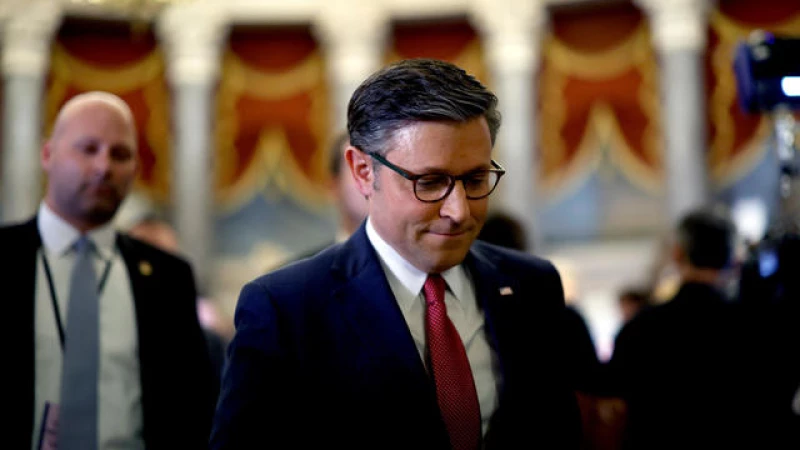Washington — Leaders in Congress revealed a highly anticipated government funding package in the early hours of Thursday, setting the stage for lawmakers to resolve a prolonged funding dispute and prevent a partial government shutdown before the Friday night deadline.
The comprehensive package consists of six bills that allocate funds for the departments of State, Homeland Security, Defense, Labor and Health and Human Services, as well as provisions for foreign operations, financial services, and the legislative branch. If passed, the package would eliminate the looming threat of a government shutdown until the start of the next fiscal year on Oct. 1.
"This appropriations legislation for FY24 demonstrates a serious commitment to bolstering our national defense by refocusing the Pentagon on its primary mission while increasing support for our courageous service members," stated House Speaker Mike Johnson. "Crucially, it discontinues funding for the United Nations agency that harbored terrorists involved in the October 7 assaults against Israel."
Insiders familiar with the discussions revealed today that the upcoming package will entail a prohibition on all direct U.S. funding for the United Nations Relief and Works Agency for Palestine Refugees, the primary humanitarian organization operating in Gaza.
Following the Biden administration's announcement in January of a temporary halt in new funding to UNRWA pending a U.N. investigation into allegations from Israel that 12 agency employees were involved in a deadly terror attack on Oct. 7, which resulted in the loss of over 1,200 lives.
Johnson disclosed that the proposed package aims to boost U.S. Immigration and Customs Enforcement's detention capacity from 34,000 to 42,000 beds, along with allocating funds for approximately 22,000 Border Patrol agents.
"Moreover, the bipartisan deal to finance the Department of Homeland Security is geared towards reinforcing the enforcement of our border and immigration laws," stated Johnson. "It notably reduces funding for non-governmental organizations that encourage illegal immigration, while also ramping up detention capacity and Border Patrol agent numbers to align with levels in the House-passed appropriations bill and the Secure the Border Act."
There were challenges in reaching an agreement on the proposal earlier in the week, missing the target of finalizing a deal over the weekend due to the DHS funding becoming a point of contention. However, leaders made an announcement on Tuesday morning that they had successfully come to a consensus.
The Challenge of Annual Spending Bills
This year, the annual spending bills proved to be particularly challenging for lawmakers. The disagreements among them gained new significance in the midst of an ongoing debate on how to address border security in Congress.
The Race Against Time
With the release of the bill's text, a tight timeline has been set to approve the legislation and prevent a partial government shutdown by 12 a.m. Saturday. Normally, House lawmakers have 72 hours to review legislation before a vote. However, due to the looming shutdown deadline, this timeline is expected to be shortened, potentially frustrating some House conservatives who are already unhappy with the spending agreement.
The House is anticipated to pass the legislation under suspension of the rules, needing the support of two-thirds of the chamber. Despite resistance from certain House conservatives, Democrats are likely to join the majority of House Republicans to push the legislation through before sending it to the Senate.
Over in the Senate, unanimous agreement will be necessary to expedite the legislation, as a single senator has the ability to delay its progress. If any issues arise, a short-term funding measure may be required to keep the government running, or there could be a lapse in funding for certain government agencies.
"If there's bipartisan cooperation, we can get this package passed by the deadline," Sen. Patty Murray, the top Democratic appropriator in the Senate said Wednesday. "We need to turn the page on fiscal year '24, take the government off of autopilot, and focus on passing these bills by Friday at midnight."
Lawmakers are set to leave Washington for a two-week recess beginning next week. Any hiccup would likely require lawmakers to work over the weekend.
Some senators expressed frustration over the time crunch. Sen. Mike Lee, a Utah Republican, advocated for a continuing resolution to keep the government funded for a few weeks while allowing time for debate.
"This is just common sense," Lee said. "Give the people's elected lawmakers the chance to be involved in the lawmaking process, because we're certainly not doing that now."
Sen. Cynthia Lummis, a Wyoming Republican, said she'd likely vote against the package, "just because I don't have time to even look at what's in it."
With the text and expected votes on the package, Congress is nearing a resolution to the government funding dilemma that has been prolonged for months. The package is the second of two — lawmakers approved funding that covers a smaller portion of the government earlier this month.
"The appropriations process had to be completed. I am thrilled to announce that we are nearing the end of that," House Speaker Mike Johnson stated during a press briefing on Wednesday. "I believe the final outcome includes many key provisions and victories, moving us in the desired direction despite our small, historically limited majority."
Johnson mentioned that once the appropriations process is fully settled, focus will shift to supplemental funding in the House. The White House has been pushing for additional funding for U.S. allies, such as Ukraine and Israel, for several months, and the Senate had already approved the funding earlier in the year. However, Johnson has been against bringing this measure to a vote in the House.
The speaker mentioned that the conference is currently exploring "various options" to address the supplemental funding issues.







